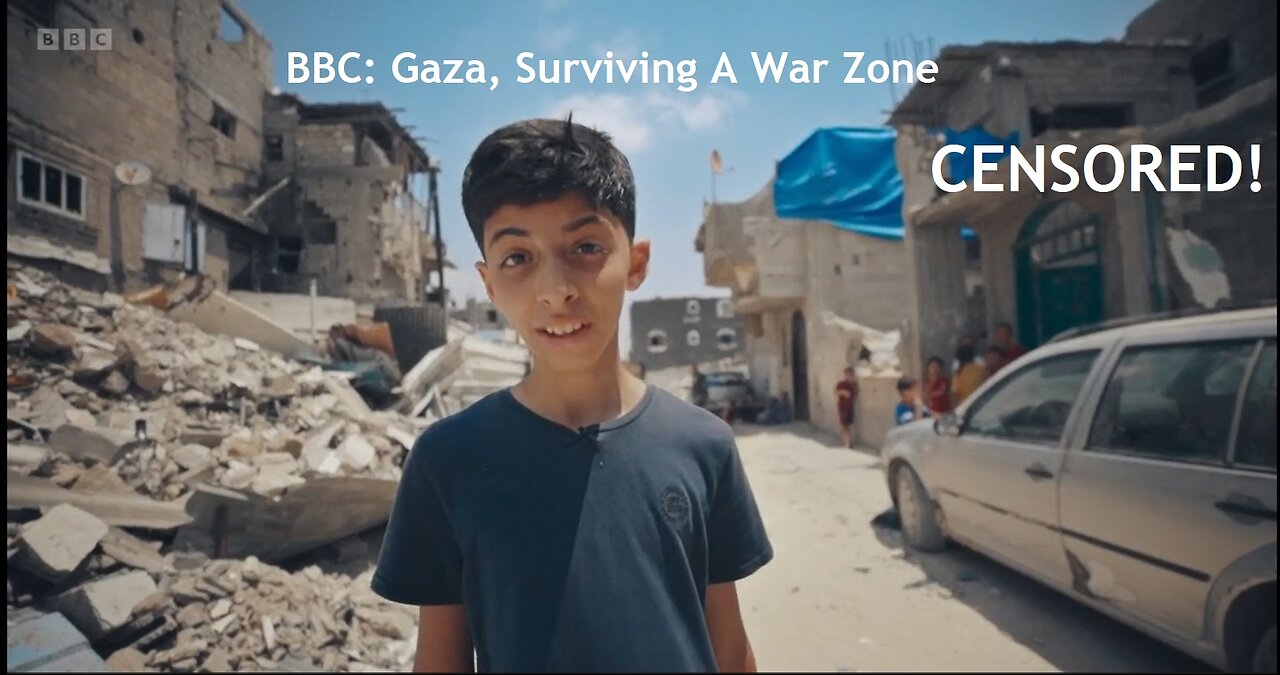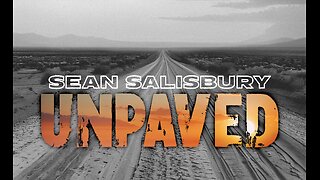Premium Only Content

BBC: Gaza, How To Survive A War Zone documentary CENSORED by ISRAEL GENOCIDE LOBBY
A BBC documentary, featuring the son of Gaza's former agriculture minister, that the BBC themselves took down shortly after they posted it under political pressure from the Zionist lobby, who also made sure it was blocked from 'legacy media' at YouTube.
Gaza: How to Survive a Warzone
TX: Wednesday 19 February 2025 at 23:35 GMT
BBC Two
TX: Monday 17 February 2025 at 21:00 GMT
BBC Two except Northern Ireland & Northern Ireland HD
https://www.bbc.co.uk/programmes/m00285w7
Following the lives of four young people trying to survive the Israel-Hamas war as they hope for a ceasefire - a vivid and unflinching view of life in a warzone.
Israel does not allow foreign journalists to report independently in Gaza. To make this film, two producers based in London remotely directed two cameramen on the ground in Gaza over nine months, gaining access to key locations out of reach to foreign press.
The dramatic documentary sheds new light on life inside Gaza’s humanitarian ‘safe zone’ – showing everyday life with ongoing airstrikes and efforts to keep people alive in its only functioning permanent hospital, Al-Aqsa.
Show less
59 minutes
Last on
Wednesday 23:35
BBC Two except Northern Ireland & Northern Ireland HD
Credits
Role Contributor
Narrator Abdullah Al-Yazouri
Director Yousef Hammash
Producer Yousef Hammash
Director Jamie Roberts
Producer Jamie Roberts
Film Editor Kate Spankie
Line Producer Claire Walker
Executive Producer Jonathan Smith
Production Company Hoyo Films Ltd
'We followed lives of three children surviving war in Gaza. Here's what we found'
https://www.bbc.co.uk/news/articles/c5y7ndlrl3vo
Jamie Roberts
Co-director, Gaza: How to Survive a Warzone
BBC Zakaria wears a blue and white hoodie as he sits on some rubble and puts his hands behind his head while smiling. BBC
Zakaria lives on his own at al-Aqsa hospital where he helps paramedics bring in casualties
Zakaria is 11 years old and lives in Gaza. He reckons he has seen thousands of bodies since the war started.
But at an age when children are typically found in a classroom, Zakaria is volunteering at one of Gaza's few functioning hospitals - al-Aqsa.
As a succession of ambulances ferrying victims of the war between Israel and Hamas pull up outside the facility in the central town of Deir al-Balah, Zakaria clears a way through the crowds to retrieve newly arrived patients and rush them inside for treatment.
Moments later he is running through the corridors of the hospital with a stretcher and later carries a young child inside to the emergency room.
Several of his schoolfriends have been killed since the conflict started and hanging around the hospital means Zakaria witnesses shocking scenes. He says that once, after an Israeli strike, he saw a boy in front of him burn to death in a fire.
"I must have seen at least 5,000 bodies. I saw them with my own eyes," he tells our cameraman.
Abdullah wears a green polo shirt as does his schoolwork on a table in a garden. He is writing on paper with a pen as he looks up towards the camera.
Abdullah attended the British school in Gaza before the war and does his best to continue studying
Zakaria is one of the children and young people we spent nine months following for our BBC documentary Gaza: How to Survive a Warzone.
It's a film that my colleague Yousef Hammash and I co-directed from London, because international journalists have not been allowed by Israel to enter the Gaza Strip and report independently since the start of the war 16 months ago.
To gather the footage and the interviews, we employed two cameramen who live in Gaza - Amjad Al Fayoumi and Ibrahim Abu Ishaiba - communicating with them regularly using messaging apps, internet calls and mobile phone networks.
Yousef and I wanted to make this documentary to show what everyday life is like for Gazan people trying to survive the horrors of this conflict as it unfolded. We finished filming a few weeks ago, on the day the current ceasefire started.
We focused on three children and a young woman with a newborn because they are the innocents in this war, which came to a shaky pause on 19 January when a hostage release deal between Hamas and Israel took effect.
More than 48,200 people have been killed in Gaza during Israel's offensive, according to the Hamas-run health ministry. The military action followed the attacks on southern Israel by Hamas on 7 October 2023 in which about 1,200 people were killed and 251 taken hostage.
By and large we filmed in an area of southern and central Gaza earmarked by Israel's army as a "humanitarian zone", where Palestinians were told to go for their own safety. Despite its designation, the zone itself was struck almost 100 times between May 2024 and January this year, according to analysis by BBC Verify. The Israel Defense Forces said it was targeting Hamas fighters operating there....
-
 LIVE
LIVE
Russell Brand
2 hours agoBritain Divided or United? My Talk With Tommy Robinson - SF628
34,425 watching -
 LIVE
LIVE
Dr Disrespect
1 hour ago🔴LIVE: Hell Is Us Launch - DR DISRESPECT’s First Look at the Scariest Game of 2025!
1,201 watching -
 1:00:35
1:00:35
Timcast
1 hour agoDOJ To BAN Transgenders From Owning Guns
46.4K56 -
 LIVE
LIVE
Sean Unpaved
44 minutes agoThursday Night Thrills & Kawhi's No-Show Gig in LA
234 watching -
 LIVE
LIVE
Side Scrollers Podcast
1 hour agoUK JAILS TV WRITER FOR WRONG THINK + TWITCH ALLOWS CYBERSTALKING + MORE | SIDE SCROLLERS LIVE
246 watching -
 LIVE
LIVE
Viss
1 hour ago🔴LIVE - PUBG Solo Tactics To Win Consistently! - PUBG 101
104 watching -

Steven Crowder
3 hours agoLive Reaction: RFK Faces Senate Grilling After Employees Demand His Resignation
196K156 -
 1:02:58
1:02:58
The Rubin Report
2 hours agoPress Stunned by Trump’s Brutally Honest Message for Elon Musk
26.9K30 -
 LIVE
LIVE
Rebel News
23 minutes agoPolice chief says 'comply' with intruders, Carney on temp workers, Trump on tariffs | Rebel Roundup
329 watching -
 LIVE
LIVE
Neil McCoy-Ward
1 hour ago🚨 Hospitals Are Bracing For MASS Casualties...
88 watching